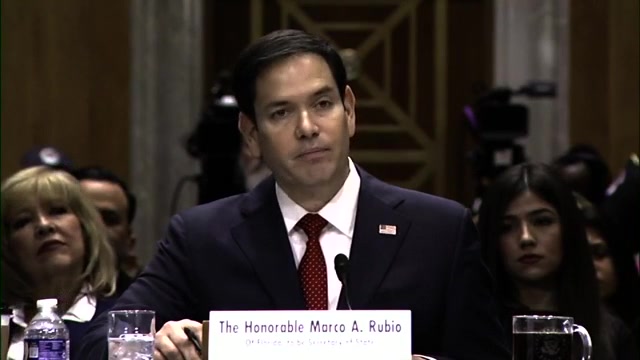Marco Rubio Confirmed as Secretary of State
On a significant day for the Biden administration, the U.S. Senate cast a unanimous vote to confirm Marco Rubio as the Secretary of State. This decisive 99-0 vote not only marks a swift appointment but also positions President Donald Trump as the first member of his new Cabinet on Inauguration Day. Such clean affirmation reflects Rubio’s relatively uncontroversial standing among Trump’s nominees, paving the way for his new role in shaping U.S. foreign policy.
Background and Early Proceedings
Marco Rubio, a Republican senator hailing from Florida, was acknowledged as the least contentious of Trump’s selections. Following his unanimous confirmation, another nominee, John Ratcliffe for CIA director, was poised for a vote as early as the next day, showcasing a quick agenda for the Senate to address the new administration’s key appointments. Rubric’s confirmation, lauded by senior Republican leaders, was highlighted for his extensive understanding of U.S. foreign policy, reflecting a strategic approach toward the administration’s upcoming challenges.
Senate Tradition and Speed
Senate traditions dictate that the chamber often convenes immediately following the inauguration ceremonies to expedite the confirmation of the president’s key appointments, especially in national security roles. This practice was evident during the inauguration of President Biden when his choice for director of national intelligence was confirmed on the same day. Just as with previous administrations, the urgency to solidify the Cabinet indicates the vital nature of having a functional government infrastructure to navigate complex global affairs.
Republican Majority and Confirmation Dynamics
The majority control of Republicans in Congress under President Trump’s second term has streamlined the confirmation process for his Cabinet, even in the face of initial skepticism. As several controversies loomed over other nominees, it became apparent that Democrats adopted a somewhat collaborative approach in confirming candidates like Rubio, who was regarded as a competently qualified nominee. This bipartisanship, however, may reflect a strategic move to maintain political balance instead of an outright witch hunt against Trump’s selections.
Addressing Challenges Ahead
In the wake of his confirmation, Rubio expressed optimism about his new position, emphasizing the critical nature of the role he is stepping into. He acknowledged the substantial work ahead in a tumultuous global landscape, which requires adept diplomacy and strategic engagement. His elevation to this key role as the first Latino Secretary of State marks a noteworthy achievement within the context of U.S. political history, reflecting the growing diversity of leadership in high-level government roles.
Rubio’s Experience and Perspective
Rubio’s extensive experience in foreign affairs, particularly concerning South America, and his strong stances on China suggest a proactive yet careful approach to international relations. During his confirmation hearing, he spoke candidly about the issues stemming from the “imbalanced relationship” between the U.S. and China, highlighting his internationalist perspective, despite aligning with Trump’s more isolationist rhetoric. This dual approach could prove vital in navigating complex foreign challenges amid changing geopolitical dynamics.
Democratic Stance and Future Nominees
Although Senate Democrats appeared cooperative in the confirmation of Rubio, their overall strategy involved close scrutiny of other nominees with lower public approval ratings. This collaborative spirit may not extend to all candidates, especially those perceived as unqualified. Senate Democratic Leader Chuck Schumer underscored this sentiment, stating that the party would neither rubber-stamp candidates nor obstruct worthy nominees, reflecting a nuanced approach to governance.
Conclusion
Marco Rubio’s confirmation as Secretary of State marks an important moment for the Biden administration, indicating a commitment to facilitating an experienced and capable leadership team. As challenges in foreign relations persist and evolve, Rubio’s expertise and bipartisan support could play crucial roles in shaping the U.S.’s international agenda. With a divided Senate, the pathway ahead remains complicated as other nominees undergo scrutiny, but the overall clarity in the immediate confirmations reflects a cohesive effort to stabilize U.S. leadership in the global landscape.
FAQs
Who is Marco Rubio?
Marco Rubio is a Republican senator from Florida, who was confirmed as the Secretary of State. He has a strong background in foreign policy and has been recognized for his experience and knowledgeable approach to international relations.
What does the role of Secretary of State entail?
The Secretary of State is the top diplomat of the United States, managing the country’s foreign affairs and serving as a key advisor to the president on international relations, foreign policy, and diplomatic initiatives.
Why was Rubio’s confirmation significant?
Rubio’s confirmation is significant as he is the first Latino to hold the position of Secretary of State, indicating increasing diversity in government leadership roles. His experience in foreign policy is expected to help guide future U.S. international engagements.
What are the implications of a unanimous Senate vote?
A unanimous Senate vote indicates strong bipartisan support for the nominee, which could facilitate smoother confirmation processes for future candidates and reflect a sense of urgency and unity in addressing national and international challenges.
What challenges does the new administration face?
The administration is expected to navigate various challenges, including geopolitical relations with China, ongoing issues in the Middle East, managing U.S. involvement in global conflicts, and addressing domestic concerns about national security.

